Key takeaways:
- Experiential learning enhances knowledge retention through direct experience, problem-solving, and reflection.
- Workshops foster community, critical thinking, adaptability, and resilience among participants.
- Different types of workshops, such as nature-based, creative, and problem-solving, facilitate unique skill development.
- Practical application of skills from workshops, like public speaking and negotiation, translates into real-life situations, promoting personal growth.
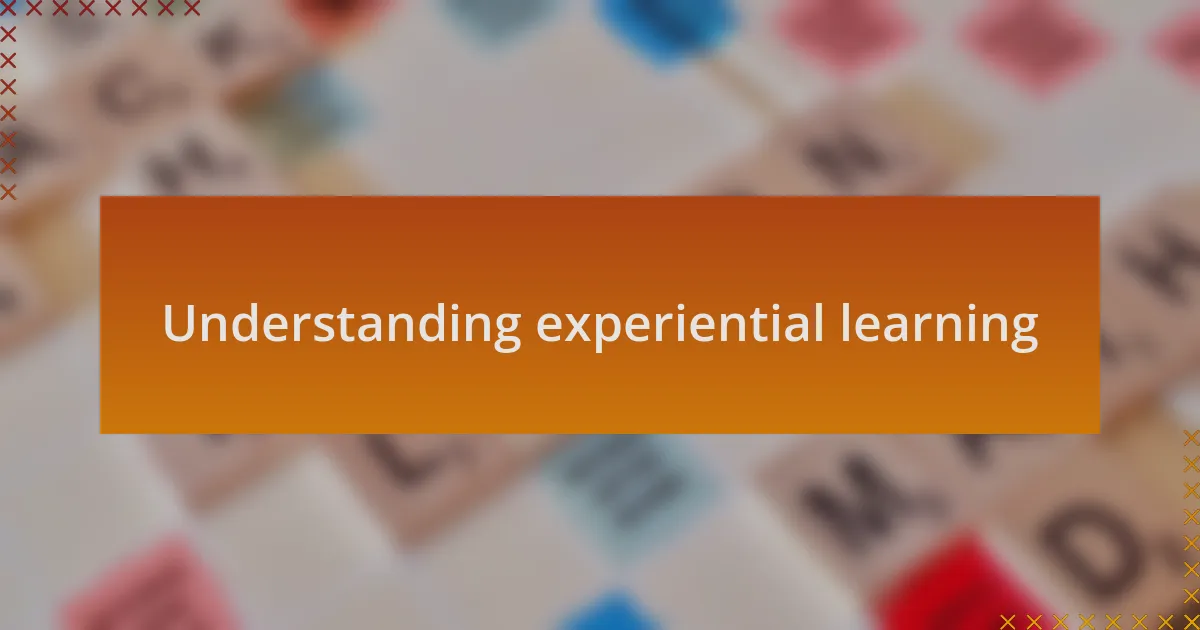
Understanding experiential learning
Experiential learning is a dynamic process where knowledge is acquired through direct experience rather than through traditional instruction. I vividly recall a workshop where we collaboratively built a model as a team. The thrill of problem-solving in real-time made the concepts stick like glue, and I noticed how much more I learned from my mistakes than from the success of the final model.
One core principle of experiential learning is reflection. After each activity, we discussed what worked and what didn’t, allowing deeper understanding to flourish. I found myself asking, “How could I apply this in my own life?” It was a pivotal moment that bridged the gap between theory and practice, drawing me into a richer understanding of each lesson.
Additionally, the emotional involvement in these types of learning experiences is profound. I remember feeling the adrenaline rush as I faced challenges, which sparked a sense of ownership and commitment. Isn’t it powerful to think about how our feelings can enhance our learning? Engaging emotions make lessons memorable and applicable in the real world, further grounding the experience in our minds and hearts.
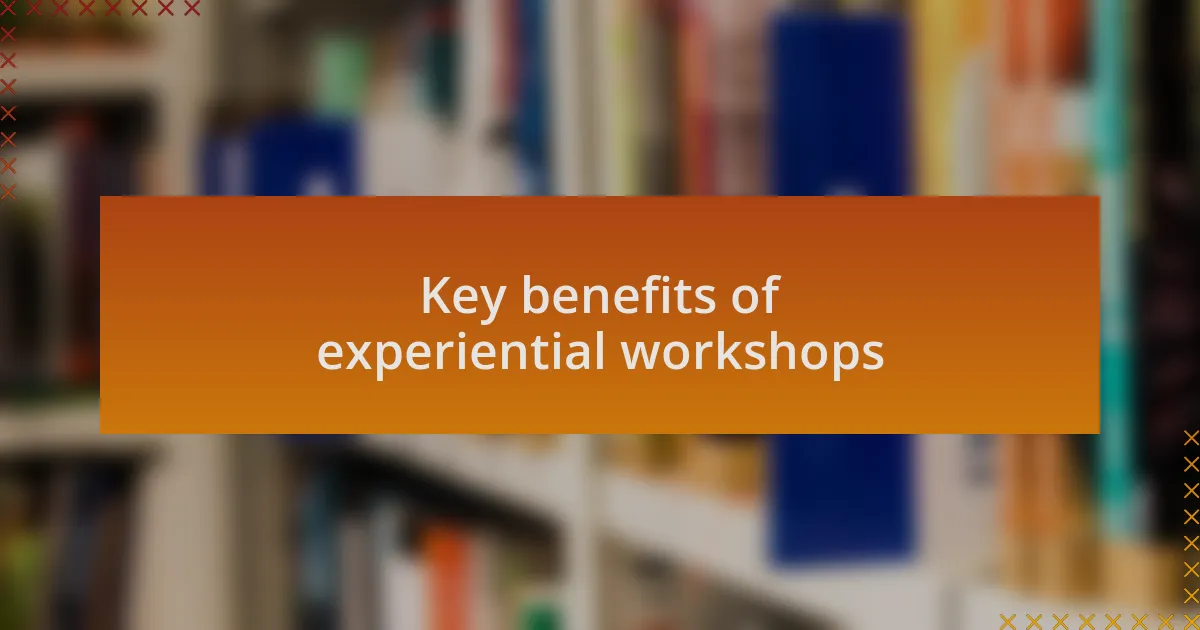
Key benefits of experiential workshops
Experiential workshops bring a powerful sense of community among participants. I remember a moment in a team-building workshop where we faced a challenging obstacle course together. The laughter, shared frustrations, and eventual triumph fostered bonds that went beyond that day. How often do we get to connect with others in such an authentic way? It’s a benefit that extends our networks and builds lasting relationships.
Another key advantage is the development of critical thinking skills. In one workshop, we engaged in case studies that required quick decision-making and creativity. I was surprised by how my mind opened to different perspectives while we debated various solutions. Isn’t it fascinating how facing a problem from multiple angles not only sharpens our intellect but also boosts our confidence in tackling future challenges?
Lastly, experiential workshops encourage adaptability and resilience. I recall a session where we had to pivot our project due to unforeseen challenges. Initially, I felt overwhelmed, but learning to adjust my approach in real-time taught me invaluable lessons about flexibility. How do we usually handle unexpected situations? Embracing this adaptability in a supportive environment prepares us for real-world uncertainties, making the experience all the more valuable.
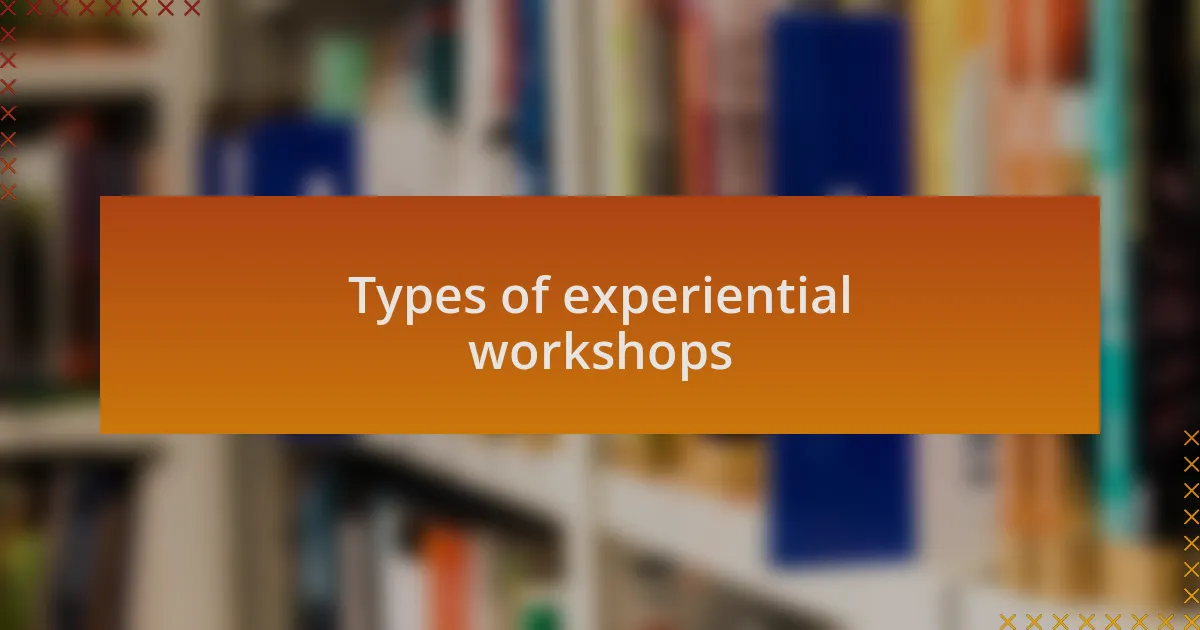
Types of experiential workshops
There are several types of experiential workshops, each designed to enhance different skills or foster unique experiences. For instance, I participated in a nature-based workshop where we immersed ourselves in the outdoors to build teamwork and communication skills. It was astounding how the simple act of navigating the trails together forced us to rely on each other and collaborate in ways that a conventional setting never could.
Another type I’m particularly fond of is creative workshops, like the art-based session I attended that focused on self-expression through painting. Initially, I felt hesitant. Could I truly express my feelings on canvas? But as I delved into the colors and strokes, I discovered a new outlet for my emotions. These workshops often encourage participants to explore aspects of themselves they didn’t know existed, which can be both enlightening and empowering.
Lastly, there are experiential workshops centered around problem-solving, often incorporating simulations or role-playing exercises. I remember a session where we took on different roles in a corporate crisis scenario. It was intense! I learned not only how to think on my feet but also how empathy plays a crucial role in effective collaboration. Have you ever found yourself in a situation that demanded an unexpected response? These workshops prepare you for such moments, making them not just a learning experience but a valuable life skill.
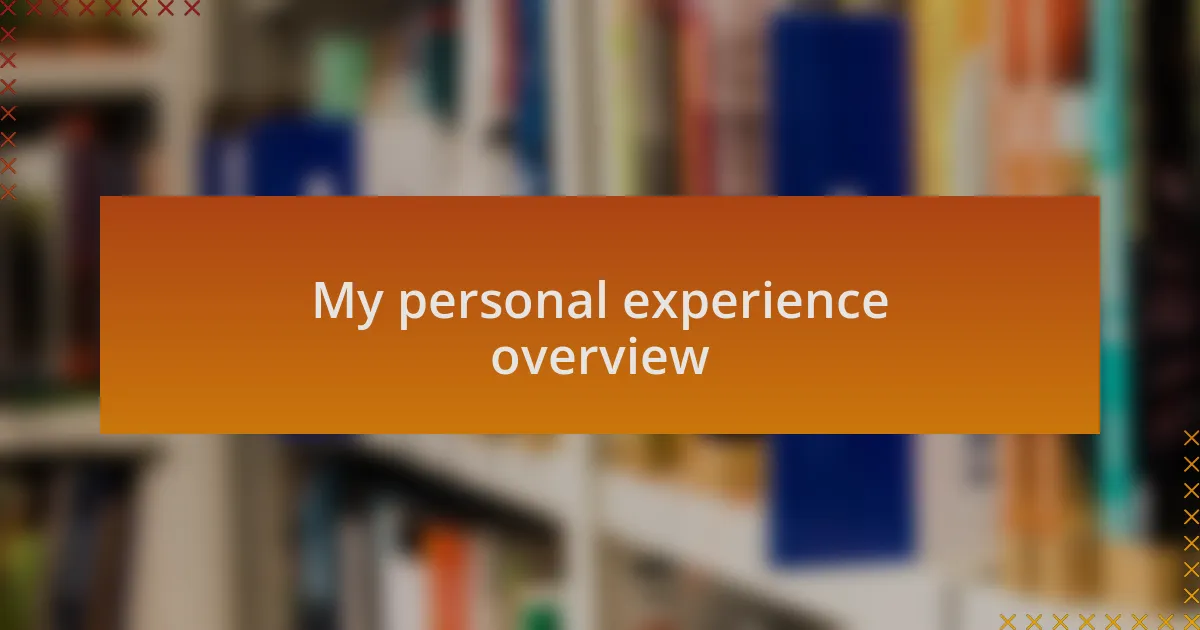
My personal experience overview
Participating in experiential workshops has profoundly shaped my outlook on learning. I recall a particularly memorable session focused on conflict resolution. It felt surreal to engage in role-playing where we were required to navigate disagreements. I found myself grappling with uncomfortable emotions, but, as we worked through scenarios, I realized how essential active listening and empathy are in resolving conflicts. Have you ever felt that tension dissipate once understanding is reached? That’s the magic of experiential learning.
In another instance, I attended a leadership workshop where we built a bridge using only basic materials provided to us. The stakes felt high, but what struck me was the collective creativity that emerged from our diverse ideas. We faced frustration when things didn’t fit together as planned, yet those moments taught us resilience and the power of iteration. It’s fascinating how practical activities can unveil leadership qualities in real time, isn’t it? I walked away feeling not only accomplished but also more connected to my peers.
The beauty of these workshops lies not just in the skills we develop, but in the rich emotional tapestry woven through shared experiences. I’ve laughed, struggled, and grown alongside others. Each moment served as a reminder that learning happens best when we step outside our comfort zones. Wouldn’t you agree that the most impactful lessons often come from the unexpected?
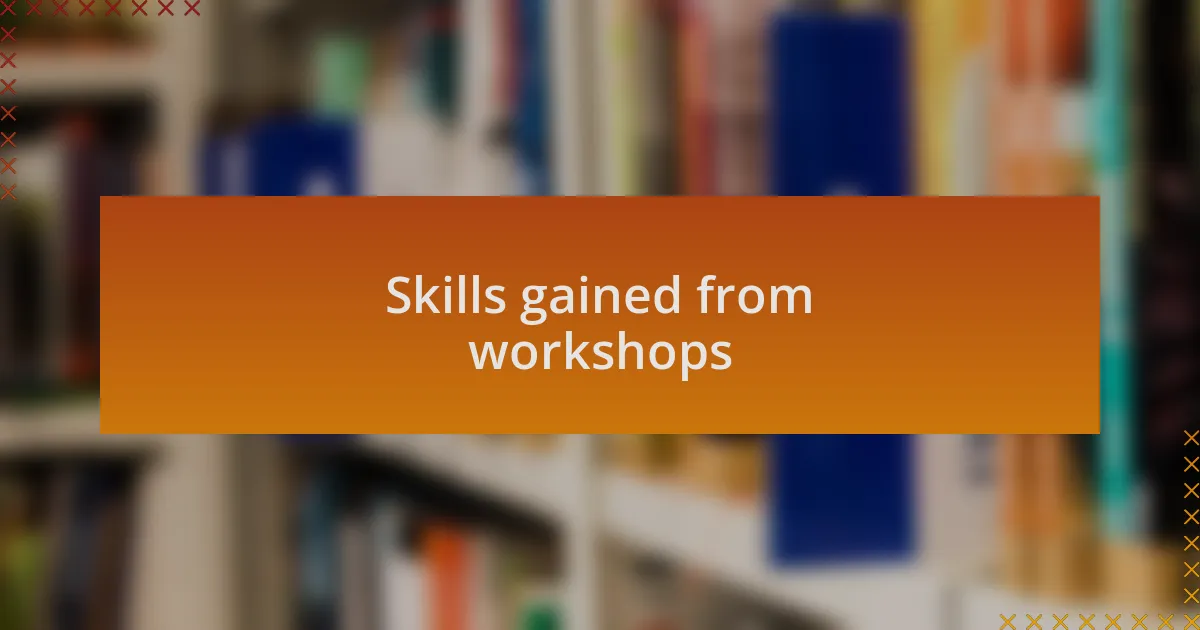
Skills gained from workshops
Engaging in workshops has helped me develop crucial teamwork skills. I remember a particular exercise where we were divided into small groups to solve a complex puzzle. Initially, navigating different personalities proved challenging, but as we communicated effectively and shared our perspectives, I discovered that collaboration can lead to innovative solutions. Have you ever witnessed how shared efforts can elevate a simple task into something extraordinary?
Beyond teamwork, my experience with time management has drastically improved through workshops. During one session, we had only a limited time to complete a project that required meticulous planning and delegation. It pushed me to prioritize tasks and make quick decisions. I still recall the adrenaline rush when we successfully met the deadline. Isn’t it amazing how a tight timeframe can sharpen our focus and foster efficiency?
Moreover, these workshops have honed my critical thinking skills. In one memorable activity, we analyzed real-world case studies in teams. Each perspective brought a new angle to the discussion, allowing me to challenge my assumptions and think critically about various outcomes. I find it empowering to realize that asking the right questions often leads to deeper insights. Don’t you think that the ability to critically assess situations is essential in our fast-paced world?
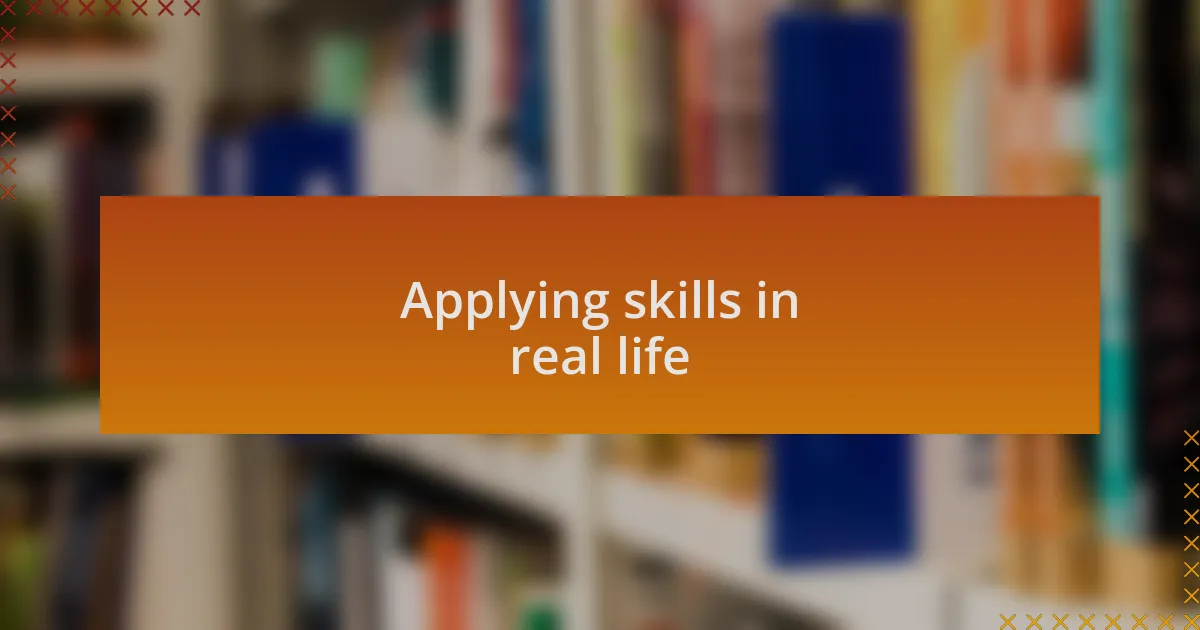
Applying skills in real life
Applying skills in real life often comes down to the moments where theory meets practice. I remember taking a workshop focused on public speaking and presentation skills. The practical exercises truly pushed me out of my comfort zone. Delivering a speech in front of my peers felt daunting, but receiving constructive feedback helped me refine my technique. Isn’t it fascinating how stepping into an uncomfortable situation can turn into a growth opportunity?
In another experience, I participated in a hands-on negotiation workshop that simulated real-life scenarios. We acted out various roles in a heated negotiation, and the tension in the room was palpable. It was exhilarating and also a bit nerve-wracking, but I learned invaluable skills—like reading body language and adapting my communication style on the fly. Have you ever felt your heart race during a pivotal moment, only to realize that it’s a stepping stone to refining your abilities?
One remarkable instance occurred during a workshop that emphasized conflict resolution. We engaged in role-playing exercises that mimicked workplace disagreements. I remember feeling the weight of my emotions as I navigated through a heated situation. By applying the techniques we discussed, I could shift the conversation toward a collaborative solution. Isn’t it incredible how such experiences can reshape our perspectives and equip us with tools for real-world challenges?